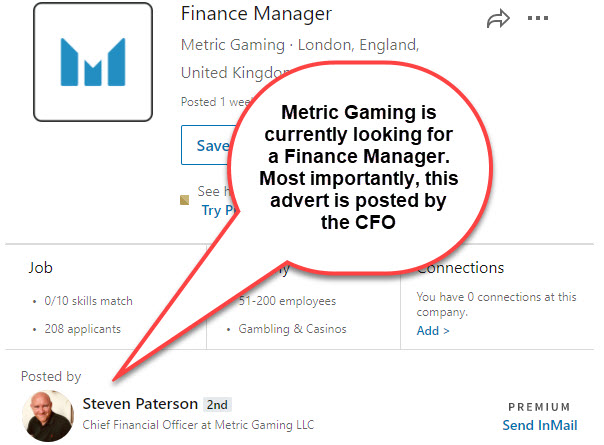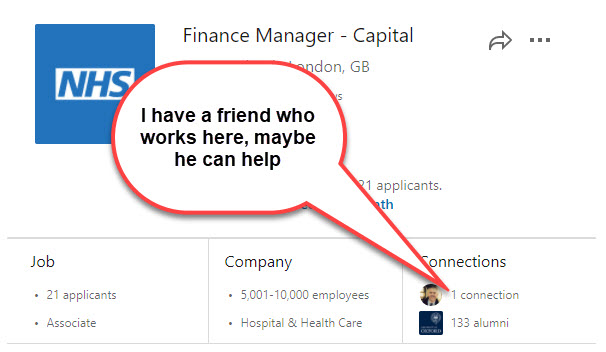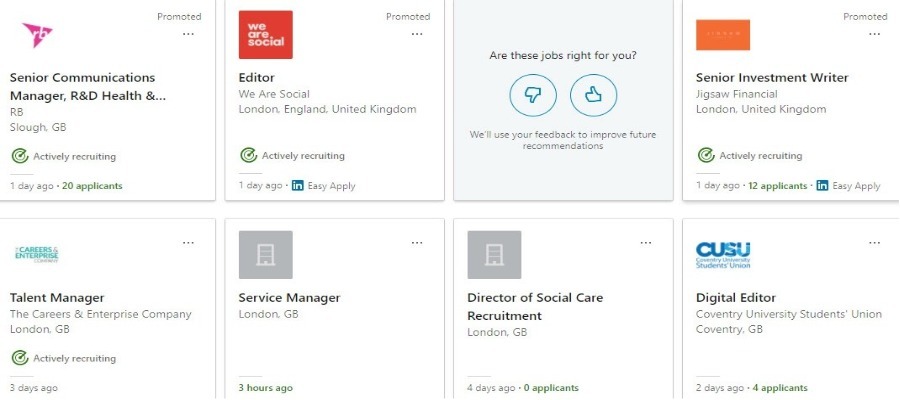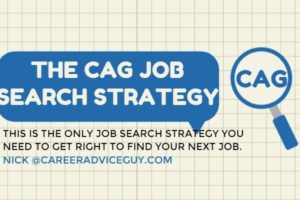I’m not too fond of job boards. Yes, there is a place in any candidate’s job search, but with the growth of the internet over the last few years, that place is becoming less and less. The biggest problem with any job advert, is the sheer number of applicants that apply to each role. Statistics show for each Graduate Job Advert, there are 700 applicants, while mid-management is about 300. In my experience, I have placed an advert online for a Personal Assistant and had over 2,000 replies.
The real problem with job boards is standing out. I’ve talked about designing your CV to take into account a companies applicant tracking system. However, if you’re competing with 2,000 applicants and 10% have designed their CV using ATS keywords, you still have 200 competitors for the position.
In this job search strategy, we’re looking at job boards, how you should use them and probably more importantly, where you should not bother.
Relevance
The keyword, when a candidate starts thinking about using a job board, needs to be relevance. Typically relevance comes in three parts, firstly your CV, and secondly the job advert that you’re applying to, and the position compared to your experience.
75% of all recruiters will use some form of applicant tracking system to search through candidate applications. At the very minimum, when you apply through a job advert, the recruiter will use the search facility within the job board to search candidate CV.
At the other end of the scale, companies will use applicant tracking systems with every search facility imaginable, to sort through a candidates CV. On a personal basis, my ATS program allows me to search on the following, Keywords, job titles, locations, skills, past companies, past industries, years of experience and job functions. The most important function is Keywords. This allows me to search for specific keywords within your CV. If the hiring manager asks for a particular experience, I would expect to see it on your CV, and as such, will search for it to narrow down applications quickly.
Your CV
Before you apply to a job via a job advert, think about your CV and how it’s written. The majority of companies across the world will use some form of applicant tracking systems (ATS) to sort through the thousands of CV’s they receive each week automatically.
This means that you’re CV might not even be looked at by a recruiter or hiring manager, and is simply reviewed by the ATS portal and graded to it’s relevancy to the job search criteria. If you’ve not written it correctly, and have not focused on your relevant keywords, your CV could be given a low relevancy score, and an automatic email will be sent to say that you’ve not been successful.
Relevant Job Boards
The second part of job relevancy is the job board. If you head over to Indeed.com and search for “Sales Manager”, there are currently 8,307 jobs. Sadly, Indeed.com makes it so easy to apply for a position, it’s literally a click of a button. As a consequence, it’s feasible to apply to every sales manager job advert on the site. What might be more surprising, if you did apply to every job, I doubt you’d get a single reply. Over the years, I’ve spoken to candidates who have applied to hundreds of roles and never heard.
One way to increase your chances of being successful is to use a relevant job board. The plan is to head over to a niche job board, where your industry knowledge will substantially improve your chances of being successful. As an example;
- http://www.simplysalesjobs.co.uk – If your looking for a sales job in the UK then check out SimpleSalesJobs.co.uk. They only have sales jobs, and therefore if you’re an experienced sales professional, this is the type of job board that you should be focusing your time on.
- https://www.rigzone.com – specialises in Oil and Gas jobs across the world across a range of disciplines from Finance and Sales to Operations and Engineers. If you’ve got experience in O&G, then this is the type of job board you should be focusing your time on. Hiring managers will like that you’ve already got experience in the industry, and your relevancy score on any applicant tracking system will be high.
Relevant Jobs
The third and final part of job advert relevancy is probably the most important. You need to find and apply to jobs that are relevant to you. The is means finding jobs that are a step-up or possible step-side ways, in a similar industry.
As an example, if I’m a sales manager working for a technology company, selling personal computer, realistically I should be looking for more senior sales manager or team leader position, but also selling personal computers.
There is no point in applying for a Head of Sales, heading up a multinational team as you don’t have the experience. On the same topic, there is no point in applying to a junior sales associate, as this will not be a challenge.
There is also no point in applying to sale Manager working outside of selling personal computers. Yes, I’m sure you could do the job, but hiring managers like people with similar experience. If you have personal computer experience, there no point in applying to Financial services or Chemical Industries, as your experience is not relevant.
Job Board Alerts
One of the best ways to use a job board is to sign up for job alerts. The idea is that you’ll be emailed a breakdown of the latest jobs, that match your set criteria, allowing you to keep on top of the newest applications and always be one of the first to apply.
Job boards love sending email alerts to candidates as it’s a great way to build interest in new roles. The problem, your email box can quickly be inundated with job adverts, from all over the world, especially if you start signing up with multiple job boards.
Job board alerts are useful, but you need to make sure that you set up your job alerts correctly, following the relevancy advice above. There is no point in applying to positions that fall outside your set criteria, and therefore there no point in receiving emails about them either.
Boolean Searches
Boolean Searches is the best method for searching job boards. The idea behind a Boolean search is that it allows you to combine keywords using operators such as AND, OR, NOT, “speech marks” and (brackets). By using these operators in different combinations, you can restrict, widen or define your job search. The operators work in the following way;
- AND – When you need to combine two operators together. For example, I’m looking for a Finance Manager in London. In this example I would search for – Finance Manager AND London
- OR – When you’re looking to split two operators apart. As an example, locations. I’m looking for a job in London OR Manchester. In this example, I would search for Finance Manager AND London OR Manchester
- NOT – same as above, London OR Manchester NOT Liverpool
- “Speech Marks” – Great for searching exact job titles, such as “Finance Manager” or “Sales Manager” job adverts
- (Brackets) – allows you to separate terms while giving preference to a specified term. As an example – (“Finance Manager” OR “Financial Controller”) AND (London OR Manchester)
Taking It A Step Further
Given the technology that is available to you today, it’s possible to take your job board search a step further. Behind every job advert, is a hiring manager, and it’s likely a recruiter. Some job boards will show this, while others, you’re going to need to do some research.
In the below advert, Metric Gaming is looking for a Finance Manager. The job advert is below. Yes, you could apply to the role, but its posted by the hiring manager, The Chief Financial Officer, and as such you could take this a step further and contact him directly. This job advert is on LinkedIn allowing you to send him a LinkedIn InMail. That said, it’s not very difficult to work out his email address and send him your CV directly at work.

Some Job adverts will be posted by the hiring manager, or recruiter, but most will be posted anonymously. Again, it’s worth trying to contact the hiring manager, with or without a referral.
In the below advert, I have a connection who works at the NHS. Not only could this connection help with understanding who the hiring manager is, but they could also provide a reference to get your CV to the top of the candidate list.

Even if you don’t have a connection, often it’s not very difficult to work out the hiring manager and find their contact details. The vast majority of hiring managers and recruiters, that work at professional companies, will have a LinkedIn account, and will be traceable through their company pages.
This process will take some time, but it worth doing as it stops your CV getting lost in a ATS black whole. Remember, candidates in the past have applied to hundreds of job adverts and not revived a single reply. Often its not because of their experience, its because there CV is not written correctly, and has not been picked up by the recruiter’s applicant tracking system.
Final Thoughts
Finding a job is about combining the five job search strategies while thinking smart. You can apply to 100 jobs and not receive a single reply, but you can also reach out to 100 hiring managers or recruiters, and the same could happen.
Personally, I think there is always a place for a job board in your job search, but I do think its also a great to place to waste time, applying to hundreds of jobs, getting minimal replies, and get very frustrated in the process.
Nick Jones
Latest posts by Nick Jones (see all)
- What Job Should I Do? It Depends on Whether You’re An Introvert Or An Extrovert - November 17, 2021
- Ten Ways to Unplug and Recharge During The Holiday Season - November 3, 2021
- 10 Jobs for Teenagers to Earn Extra Money - October 13, 2021








